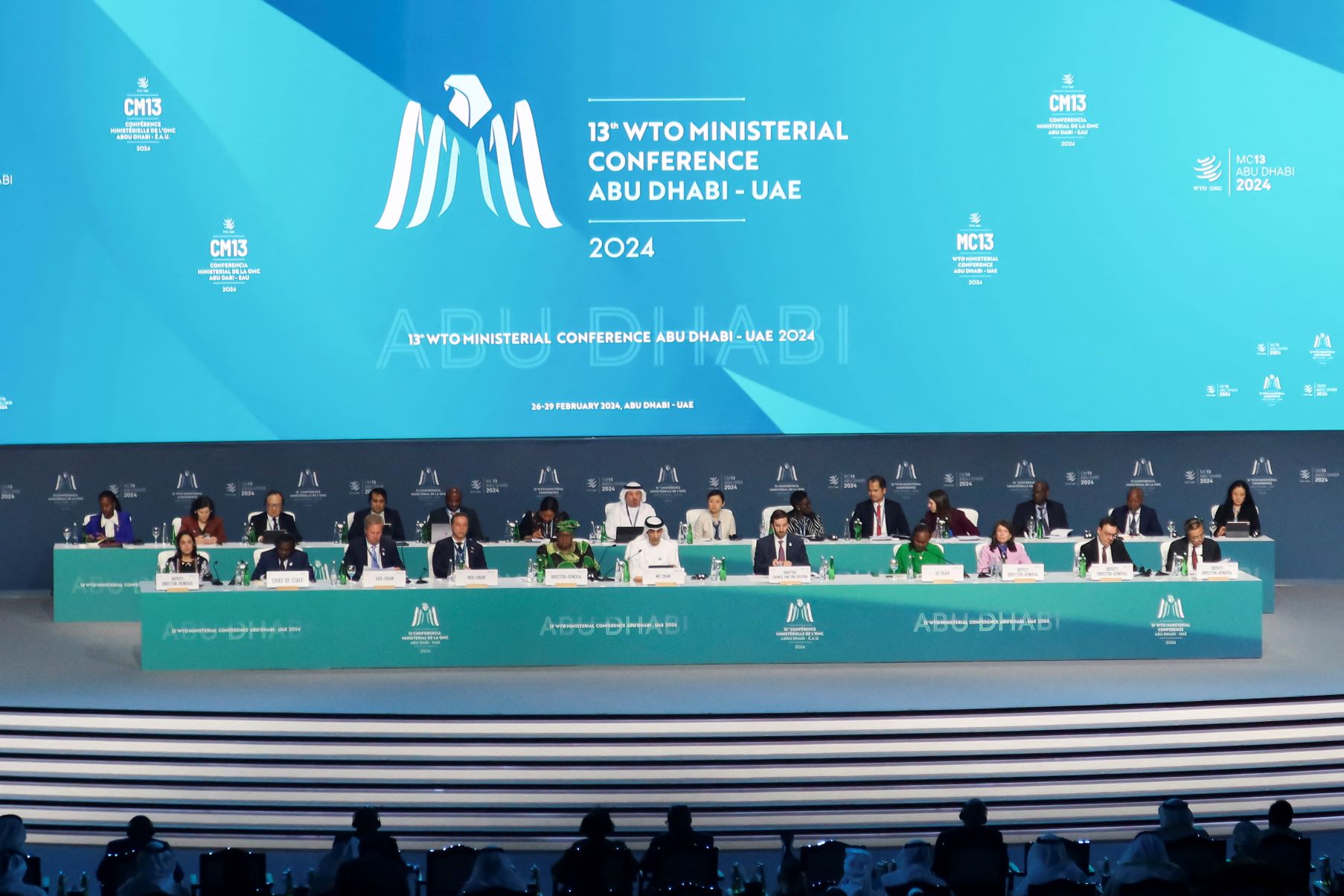The World Trade Organization (WTO) held its thirteenth ministerial conference (MC13) last week in Abu Dhabi, United Arab Emirates. Five CoC experts assess the ministerial conference’s failure to break the deadlock on new initiatives—such as agricultural trade, fisheries subsidies, and new rules for digital trade—and how, given great power tensions and growing protectionism, smaller joint initiatives could be the future of world trade.

WTO Members Kick the Can Down the Road, Again
At the start of the ministerial conference, WTO Director-General Ngozi Okonjo-Iweala called on members to pursue their interests through cooperation, stating that “leadership means you sometimes have to compromise on certain wants, so that others can secure their wants.” But after a week of meetings, her message was largely lost. WTO delegates emerged from their sleep-deprived haze with a handful of outcomes, but little to celebrate.
The standout achievement is the accession of two new members, Comoros and Timor-Leste, proof that the WTO is still an attractive organization that delivers for its members, particularly developing countries. Members also agreed, in the eleventh hour, to continue the moratorium on e-commerce duties. Though this pushes the same standoff two years down the road, it avoids a much worse outcome that would have resulted from a failure to renew it. Dispute settlement also remains unresolved, but members agreed to keep talking. In addition, a handful of members agreed to reduce regulatory barriers to services trade. A welcome achievement, but one that faced strong objections that are still holding up aspects of its implementation.
Several negotiations also went sideways. Agriculture remained intractable. Negotiations on new rules for digital trade are dead, with much credit due to the United States for injecting uncertainty into its long-held positions on that topic. Sadly, an attempt to expand disciplines to rein in harmful fisheries subsidies also fell apart, likely over developing countries’ demands for unreasonable flexibility and U.S. demands for language on forced labor. Finally, a deal among 125 members on investment facilitation was blocked by India and South Africa.
This is not to diminish the hard work behind the scenes, as delegates and WTO staff have put in tremendous hours to reach a meaningful outcome. However, international cooperation is not the guiding force of trade policy today. If the multilateral trading system is to survive, the zero-sum logic that some ministers brought to MC13 needs to be set aside in 2026.
Leading up to the meeting, the United States made the case for responsible consensus, arguing that for the WTO to evolve, members would need to adopt a more collaborative approach and shed their rigid adherence to past practices. However, responsible consensus also requires leadership, and this was sorely lacking at MC13. The WTO lives to survive another ministerial conference. More is needed to make the next one a success.
The Failed Ministerial Highlights Systemic Issues
The WTO MC13 fell short of expectations. The extended meeting in Abu Dhabi, which finished early on March 2, failed to achieve any substantive multilateral progress apart from the accessions of Timor-Leste and Comoros. Not going backward on a twenty-five-year-old moratorium on e-commerce duties was touted as a success. On the critical agenda items—agricultural trade, fisheries subsidies, and reform of the WTO’s dispute-settlement mechanism—ministers simply kicked the can down the road, undertaking to continue work and once more extend deadlines that few expect to be met.
The only positive elements were on the plurilateral side, where various groups of members worked outside the formal WTO framework on Joint Statement Initiatives to avoid the roadblocks inherent to a consensus-based system. They reached agreement on investment facilitation for development and domestic regulation of services, and saw progress in other areas, such as e-commerce and trade and environmental sustainability. Members could find a way to bring plurilateral agreements at least partially into the WTO legal framework, though problems remain.
The ministerial conference leaves the WTO further weakened at a time when multilateralism in trade—and across the board—is under siege. Battered as it is, the WTO remains a vital global asset, but its future will not be secured by upbeat spin. Realistic and practical engagement is urgently needed outside the Geneva-based organization’s echo chamber on the WTO’s problems and their causes.
This should include facing the fact that the WTO is now effectively a two-tier system. Plurilateral initiatives offer the only real prospect of responding to urgent challenges like the trade and climate change nexus, though they are resisted by a minority of governments who fear losing leverage. These initiatives need to be pursued and extended. The multilateral level has almost ceased to be a forum for trade-opening negotiations, but it remains the WTO’s systemic foundation, albeit one weakened by unilateral actions. The multilateral system needs to not only be updated and reinforced, especially by revitalizing the dispute-settlement system, but also by making better use of the transparency, information, and conciliation capacity of the existing structure. The geopolitical outlook for the near future is gloomy. If the WTO is to provide stability, it needs to find better ways of working than what happened at the WTO MC13.
WTO Rules Are Openly Flouted, but Are Still Important
The official communique that marked the end of MC13 naturally touts the WTO’s achievements, such as the renewal of the temporary suspension of tariffs on e-commerce. This is certainly an important element that stabilizes the conditions in this rapidly growing part of trade in services. But e-commerce remains relatively niche.
Another supposed success was renewing the commitment to have a competent, fully functioning dispute-settlement system by 2024. This seems farfetched, as the United States shows no signs that it is willing to return to the binding dispute-settlement system that had been the key innovation when the WTO was created twenty-five years ago.
The principle of nondiscrimination is another vital pillar of the WTO, and even of its predecessor, the General Agreement on Tariffs and Trade (GATT). But the United States keeps its discriminatory tariffs on imports from China, and the Chinese have reacted with their own bilateral trade measures. Moreover, a new Donald Trump administration could impose even higher tariffs, especially on goods from China.
WTO rules are thus openly flouted. However, trade is holding up well, as a number of observers have noted. Trade as a percentage of the global economy reached a new record in 2022, and the supply chain problems of the last few years provide another strong indicator: container shipment prices soared due to more products being shipped across the oceans than anticipated.
One is tempted to conclude that the WTO is doubly irrelevant: it is powerless to stop great powers erecting trade barriers, but trade seems to continue even when WTO rules are broken.
But this conclusion could be wrong. Trade volumes might hold up well because supply chains are getting longer due to politically motivated discriminatory trade policies. To give a concrete example, when the United States imposes high tariffs on imports from China, some products are then assembled in Vietnam or another Asian country and then shipped to the United States. The increased production in those countries required intermediate inputs from China. The trade volume thus increases because the exports from Asia to the United States are the same as before, but Chinese exports of intermediate inputs to its Asian neighbors increase the measured volume of global trade.
This roundabout circumvention U.S. discriminatory measures is of course inefficient. The broad conclusion is thus that the WTO continues to be important, but looking at trade volumes alone is misleading.
The WTO Is a House out of Order
WTO MC13 has perhaps done all it could in a heavy election year, with sixty-four national elections set to take place. This could be a contributing factor to the modest gains that MC13 saw, if they can even be called as such. Four main developments, or the lack of progress thereof, can help us assess this ministerial.
First, WTO members still have an appetite for multilateral rulemaking. This is signified by the one-day extension of MC13 to gain clarity on the work program for the coming two years. It would have been easy to end the conference with no declaration or consensus, as was seen seven years ago at MC11. The extension of the conference is certainly outside the norm and a testament to the overall commitment to and value of multilateral cooperation for trade issues.
Second, large developing economies refuse to be bulldozed, leading to a fraying consensus. The experience of the initial GATT, while a milestone in international trade history, left a bad taste for several countries in the so-called Global South. Therefore, countries such as India and South Africa, among others, are resisting new barriers to trade in the name of non-Doha issues, such as standards for green trade and investment facilitation.
Third, what happens in Geneva often strays outside. The issues of agriculture and fisheries subsidies would have had global ripple effects; it is no wonder that several countries withheld their support. The issue of subsidies is always sensitive, especially when sectors like agriculture are involved. Accepting binding rules on these issues would be unwelcome in most developing economies. The extension of the moratorium on e-commerce is perhaps the minimum we could have hoped for.
Fourth, but most importantly, it is about time WTO members accepted culpability for essentially disabling the dispute-settlement mechanism. It is symptomatic of a house out of order. The decision on dispute-settlement body reform released as part of the MC13 decisions is lackluster. Members must seriously consider that a lack of movement on reviving the mechanism will exacerbate divisions within the WTO. Countries will not feel secure committing to new, binding, international rules without a strong appellate body that can safeguard the interests of the members.
It Is Much Easier to Destroy Than Build
Many experts were skeptical about achieving any substantive results going into WTO MC13 despite several promising proposals. Among those proposals, the most attention-grabbing, yet uncertain, was on Joint Statement Initiatives. WTO members started Joint Statement Initiatives in 2017 to reinvigorate the WTO’s deadlocked negotiating process, hoping these plurilateral negotiations among a group of members could agree on new rules that would then be formally integrated into the WTO legal text. The Investment Facilitation for Development (IFD) agreement, the first Joint Statement Initiative to finalize text, boasts participation from over 120 WTO members across all regions, representing three-quarters of WTO membership. Notably, this includes eighty-five developing economies, with twenty categorized as least-developed economies.
The IFD initiative is open to all members and will be implemented based on the most favored nation principle. In other words, even nonparticipating members can benefit from it. The inclusion of Joint Statement Initiatives in the WTO legal framework would have been a significant breakthrough in WTO negotiations. Compared with other minilateral negotiations that claim to be alliance- or club-based, the Joint Statement Initiatives within WTO stand out for their commitments to transparency and inclusiveness. Unfortunately, some major countries, including India, once again opposed and blocked the formal inclusion of the IFD agreement into the WTO framework at WTO MC13. After this failure, the gap between the more than 120 signatories and the full 166-member roster now might be insurmountable.
The WTO is at a crossroads. Members are most interested in preferential trade arrangements, which tend to be more exclusive and discriminating, at a time when multilateralism faces obstacles due to the misuse of voting rights. In our current world, marked by great power disparities, the strategic competition between the United States and China has given rise to a concerning rise in trade blocs, which jeopardize the gradual recovery of the global economy. Just ahead of the ministerial conference, the United States once again published its annual report on China’s WTO compliance. This appears to intensify tensions between the two sides, while simultaneously diverting attention from the United States’ ongoing obstruction of the revival of the appeal mechanism for dispute settlement.
Despite these challenges, several Joint Statement Initiatives within the WTO continue to receive support from major players like China, Japan, South Korea, and the European Union. This signals that the WTO still possesses resilience and relevance. The Joint Statement Initiatives, including the IFD, have traversed a six-year negotiation process from 2017 to 2023, making their success in producing some substantive results on development-relevant issues all the more precious. Regrettably, other Joint Statement Initiatives like e-commerce and services domestic regulation will probably experience similar difficulties to being incorporated into the WTO legal framework.
As we reflect on this situation, it should be recognized that the real constructive role of WTO members should be to foster integration, consensus, and cooperation, rather than repeatedly sabotaging multilateral negotiations. While some nations might have reaped short-term benefits from shifting toward trading blocs or geopolitically driven trade, perpetuating divisions and distortions in the global trade and investment landscape ultimately harms the overall global economy and undermines multilateralism.











